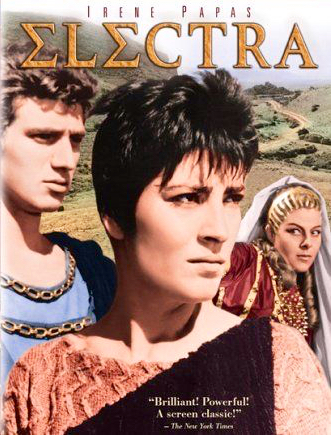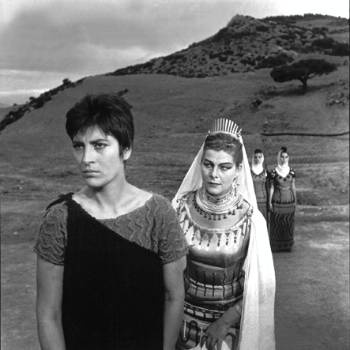Euripides’s tragedies won few prizes than those of Aeshylus and Sophocles, but seem most to speak to contemporary audiences. I think this was already the case in 1962 when Michael Cacoyannis (Michalis Kakogiannis) adapted, produced, and directed the formidable Irene Papas in the title role of his movie of Euripides’s “Electra”/”Ilektra.” The ancient Athenian theaters were outdoors, but Cacoyannis takes the story even more outdoors (on location in Greece). I wouldn’t say it is a spectacle, but it is very far from wordy, either.

There are no spoken lines for the first five minutes or so in which Agamemnon returns triumphant from the Trojan War (without a visible captive Cassandra), greets his children, and is led in to bathe by his wife, Klymenestra (Aleka Kastselli). It is her longtime (the Trojan War lasted ten years) lover Aegithus (Phoebus Rhazis)who slays Agammemnon entangle in a net, which I think it a major mistake (Klymenestra should wield the ax to slay her husband).
Neither of the later two revenge slaying is shown. It seems Orestes fights and kills Agethius rather than murdering him. Whether Electra lends a hand with killing their mother is not clear, though she is present for the deed.
(She cuts off her hair and places it on her father’s tomb early in the movie, so she looks butch a virgin.)

Yannis Fertis provides the appropriate mix of hesitation and vengeance as Orestes, and Aleka Kastselli has quite an aria justifying slaying the king who sacrificed their daughter (Iphigenia) so the becalmed Greek fleet could sail to Troy. (There is no indication that a sheep may have been substituted, as one was for Isaac when Abraham was ready to sacrifice his son to Jehovah). Anyone coming to the film not knowing the story would not know until late that Klymenestra was herself engaging in revenge, not just uxoricide to continue her relationship/joint rule with Aegithus.
There is an altogether wordless “chorus” of peasant women from the vicinity where the exiled princess (Electra) has been sent (with a respectful husband (Notis Peryalis).
Though Orestes flees at the end, there is no indication that he is pursued by the Furies or that Athena will arrange (and in some versions) decide a jury trial that will exonerate him for parricide.
The stark black-and-white cinematography of hills and clouds and the faces of the leading characters was done by a young Walter Lassaly (who would go on to lens Zorba the Greek, Tom Jones, Heat and Dust et al.), who was already a master. The film was nominated for a best foreign-language film Oscar.
©2018, Stephen O. Murray